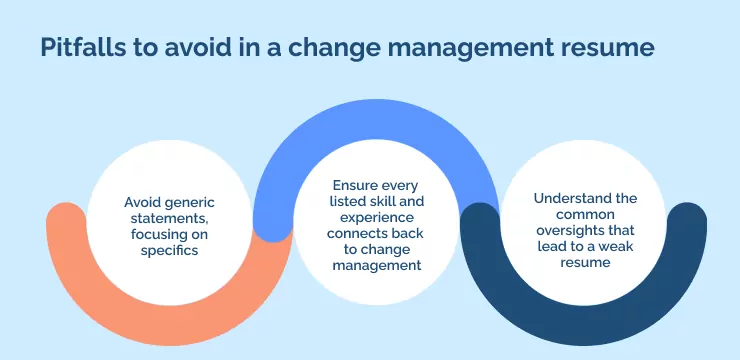
Change management is a dynamic and critical function in today’s business environment.
As a change management professional, your role involves navigating the intricacies of business transformations, guiding teams through change, and driving business outcomes.
A compelling, well-targeted resume is your ambassador, showcasing your unique blend of skills, experience, and potential.
Your resume is more than just a document listing your work history and education— it’s your professional story.
In the change management field, it’s especially crucial to craft a targeted and compelling resume. This is because your role is uniquely challenging, requiring business acumen and a deep understanding of people and processes.
Your resume should highlight your strengths and expertise and show potential employers why you fit the role perfectly.
You serve as a catalyst for change, navigating the complexities of transitions and leading teams to successful outcomes.
From implementing new technologies to restructuring departments or processes, you help organizations evolve, grow, and thrive in a constantly changing business environment. Highlighting this value on your resume is crucial to setting you apart from other candidates and landing the job you want.
In this article, we’re sharing everything you need to know to create a compelling change management resume, from the essential skills to demonstrating impact to the pitfalls to avoid.
Whether you’re looking for a new role or considering a career in change management, our guide aims to be a useful resource for getting you where you want to go.
Essential skills and competencies for change management
As you prepare your resume, remember that certain skills and competencies are critical for success in change management.
Understanding and effectively presenting these can make your resume stand out to hiring managers.
Here’s our take on the essential skills and competencies hiring managers want to see on a change management resume:
Core change management skills
Your resume should prominently feature your core change management skills.
This includes leadership, the ability to guide and motivate teams through periods of transition.
Your communication skills, critical for conveying change strategies and addressing concerns, are equally essential.
Also, problem-solving abilities, which allow you to navigate unforeseen challenges and devise effective solutions, should be highlighted.
Make sure these skills are clearly stated and, where possible, backed up by concrete examples.
Specialized skills
Beyond the core skills, your resume should reflect your proficiency in specialized areas relevant to change management.
For instance, project management skills show your ability to oversee change initiatives from inception to completion.
Risk management skills demonstrate your ability to identify potential hurdles and mitigate their impact.
Proficiency in business process reengineering is another important competency, showing your ability to redesign processes for efficiency and effectiveness.
These skills show employers you can handle the technical aspects of managing change.
The importance of showcasing interpersonal skills
Change management often involves working closely with individuals at all levels of an organization.
Your interpersonal skills, therefore, are of great importance.
Empathy shows your ability to understand the human side of change, while resilience reflects your capacity to remain steadfast in the face of challenges.
Negotiation skills can prove crucial in resolving conflicts and achieving consensus.
Include these skills in your resume, ideally with examples of how you’ve used them in previous roles.
Proficiency in change management methodologies
Another valuable asset is proficiency in recognized change management methodologies, such as ADKAR or Kotter’s 8-Step Process.
You should list these methodologies and demonstrate how you’ve applied them in your work.
This might involve outlining a successful change initiative you’ve managed using one of these methods, showing the positive outcomes that resulted.
This will assure potential employers of your hands-on experience and understanding of strategic change management frameworks.
Demonstrating impact in change management
In change management, the impact you make is central to your role’s effectiveness.
Thus, your resume must clearly communicate the tangible results of your work.
Show measurable results from past roles
Hiring managers want to see evidence of how your change management skills have made a real difference in your previous roles.
Including measurable results helps provide that evidence.
Did you lead a project that increased operational efficiency?
Or perhaps you implemented a change initiative that significantly improved team productivity?
These are the kind of accomplishments that underscore the value you bring as a change manager.
Use quantitative metrics
To effectively quantify your achievements, consider using concrete metrics.
For instance, you might include the percentage by which a project you led reduced operating costs or the amount of time saved due to a new process you implemented.
By attaching numbers to your accomplishments, you provide a clear picture of the value you can bring to a prospective employer.
Use case studies to showcase real-world examples
Real-world examples or case studies are a powerful way to highlight your change management success.
This might be a project where you facilitated a major technology upgrade, or a company-wide restructuring you led.
For each case study, provide:
- A brief overview
- The challenge
- The actions you took
- The resulting outcomes
This approach not only gives hiring managers a glimpse into your problem-solving process but also underlines your ability to drive change initiatives to successful completion.
Education and certifications found in successful change management resumes
Your educational background and certifications play an essential role in demonstrating your foundational knowledge and commitment to the field of change management.
While it’s not essential to have the perfect educational background, you should lean on these certifications if you do have them.
Relevant degrees
Here’s a handful of degrees that lead seamlessly into a career in change management:
- A degree in business, which showcases your understanding of corporate dynamics
- A degree in psychology, which indicates your knowledge of human behavior during times of change.
- A degree in management, which highlights your leadership capabilities.
Don’t put too much weight into the importance of your degree, though.
Whatever your degree, be sure to highlight any relevant coursework or projects that directly relate to change management.
Change management certifications
Certifications are a clear indicator of your dedication to the field and your desire to stay abreast of the latest change management methodologies and best practices.
Well-recognized certifications such as
should be prominently featured on your resume.
These credentials not only demonstrate your commitment to professional development, but they also provide employers with confidence in your specialized knowledge and skills.
Continuous learning
In a rapidly evolving field like change management, continuous learning is crucial.
If you’ve participated in relevant courses, seminars, or workshops outside of your formal education, be sure to include these in your resume.
This not only shows your proactive approach to staying updated but also further emphasizes your commitment to the field of change management.
It’s essential to highlight key takeaways or skills gained from these learning experiences, so potential employers understand their value.
Pitfalls to avoid in a change management resume

Just as there are elements that can strengthen your resume, there are also pitfalls that could undermine its effectiveness.
Here are a few common issues to watch out for:
Avoid generic statements, focusing on specifics
One common mistake is using generic statements or jargon without giving specific examples to back them up.
Rather than simply stating that you’re a “good leader” or a “skilled communicator,” provide specific instances where you’ve demonstrated these skills in a change management context.
The more concrete details you can give, the better picture potential employers will have of your capabilities.
Ensure every listed skill and experience connects back to change management
While it’s important to show a range of skills on your resume, ensure that each skill and experience you list has a clear connection to change management.
Highlight how your skills apply to change management processes, and provide examples of your experience in managing and implementing change.
This will help employers see the direct value you can bring to their change initiatives.
Understand the common oversights that lead to a weak resume
Some common oversights can weaken your resume.
These include typos, or failure to tailor your resume to the specific role.
Proofread your resume carefully, and make sure your resume speaks to the specific needs of the job you’re applying for.
Remember, your resume should be a targeted presentation of your skills and experience in change management, not a generic document you send to every employer.
Examples of change management resumes
Here’s a fictional example of a change management resume. Take a look, see what you think, and check out our feedback at the end.
While you’re reading, keep a mental note of how you might do it differently.
Ollie White
86569 Santiago Falls, San Francisco, CA * Phone: +1 (555) 293 1326
EXPERIENCE
SENIOR CHANGE MANAGER
Philadelphia, PA
08/2015 – present
- Conduct performance reviews and oversee career management for the Change Managers
- Facilitating workshops and other interventions to promote Change Management initiatives throughout the organization
- Embedding the Project Management Job Family and Career Path Framework into the business ensuring buy-in from project teams and cohesion with HR plans
- Planning and rolling out a learning and development strategy that supports the job family and career path framework
- Collect data, business performance information and results from business unit senior managers
- Manage Change: Manage activities in a change project. Includes engaging stakeholders in the change effort and ensuring they ready to adopt the coming changes, measuring and reporting change progress, assessing business readiness and supporting change adoption. Plan and support labour relations and/or employee relations discussions, as necessary
- Project Management: Project manage all aspects of a change project, including project planning, estimating, budgeting, resource allocation, financial management and time management for project up to an SI value of £5-10m or a portfolio of smaller change initiatives up to £5-10m SI or a project with increased complexity
IT CHANGE MANAGER
San Francisco, CA
07/2010 – 06/2015
- Conducts Change Management Service Reviews forum to review overall Change Management performance with both Change Management system customers and actors
- To monitoring the effectiveness of the change management process and make recommendations for improvement
- As part of the Service Integration, manages the process across all Providers by frequently reviewing Change Reports from all Providers
- Manage the governance of the life cycle of changes and make sure that only authorized changes are implemented
- To manage relationships and coordinate work between different teams at different locations
- Create change management strategy
- Responsible for communicating and implementing the overall direction and management of the Change Management Process
CHANGE MANAGER
San Francisco, CA
01/2004 – 04/2010
- Support new/existing clients to execute the initial and on-going transformation of their operating model. Work closely with clients during the implementation project to ensure success of the transition of their business to SEI. Manage existing clients change agendas in supporting the rollout of new services and any additional change projects for these clients
- Work with the programme to ensure change management activities are integrated into the overall project plans and approach
- Support the execution of the plans through coaching the local change management teams as well as providing coaching on programme sponsorship and leadership to senior executives within the programme
- Manage and refine OCM strategy and approach for the Programme drawing on stakeholder input lessons learned to ensure the strategy and approach is fit for purpose
- Actively participate in business development and client relationship development
- Maintains, audits and continually improves ITSM change management processes to assure coordinated multi-service provider, change management processes including: Create and process a Request for Change (RFC), Assess and evaluate change, Coordinate change with stakeholders, test change prior to release, authorize and schedule change implementation, implement change, and review and close change record
- Provides expertise support to CSM’s in the CM & RM service improvement plans
EDUCATION
PORTLAND STATE UNIVERSITY Bachelor’s Degree in Computer Science
SKILLS
- Working knowledge of MS Access and Visual Basic programming (creation of basic Macros)
- Adaptable, able to organise, prioritise work and be comfortable with being remotely managed
- To be able to develop and manage strong team relationship and partnership, with orientation towards knowledge sharing and collaboration
- Self starter with strong technical skills and ability to learn new methods quickly
- Proficient IT skills – all Microsoft office products and able to pick up other systems/databases easily
- Ability to learn new concepts and processes quickly
- Strong communication skills and the ability to structure logical analysis in presentations
- Experience and knowledge of change management principles, methodologies and tools (knowledge of Prosci)
- Ability to engage across the organisation regardless of geography, culture, function, and good understanding of how to fit diverse functional teams together
- Able to accept a significant level of responsibility and accountability
(source: Velvet Jobs)
This is a decent example. It hits all of the notes that we recommend, but there’s still much to improve.
Here’s what we would recommend to someone looking to take this CV to the next level:
- Cut to the chase and highlight how you’ve created value and impact in previous roles.
- Put quantitative metrics at the top of lists.
- Remove some of the skills which aren’t specific to change management.
- Be concise.
Remember that your CV needs to get your foot in the door. That’s all.
You can give more detail at the interview stage.
Focus on selling yourself when creating your CV.
Good luck on your change management journey
Our final piece of advice is this:
Understand that your resume is not a static document.
As you grow in your career, so too should your resume.
Update it regularly to reflect new skills, experiences, and achievements.
Also, remember to customize it to each job you apply for, focusing on the requirements and expectations outlined in the job description.
This ongoing refinement and customization process will ensure that your resume remains a powerful and effective tool in your career development.
WalkMe Team
WalkMe spearheaded the Digital Adoption Platform (DAP) for associations to use the maximum capacity of their advanced resources. Utilizing man-made consciousness, AI, and context-oriented direction, WalkMe adds a powerful UI layer to raise the computerized proficiency, everything being equal.



